POLITICS AS USUAL
Given the nastiness of the recent Republican primary debates and a sense of even worse nastiness to come with the next election, it is no surprise that thoughts of reviving Gore Vidal’s The Best Man would be imminent. Vidal’s gimlet-eyed insight into the peculiarities of the Washington political scene and his trenchant wit are what has made his play one of our best contemporary political comedies, and one can look at the play afresh and see how prescient he was about the degree of vicious behavior that is possible, regardless of which side of the political spectrum is at its center.
Nothing has been spared to make this revival look spanking good. When you enter the theater – as ushers take us to our seats sporting straw boaters with red, white, and blue bands, televisions blare, and the roar of the crowds echo in our ears – you feel as if you are indeed entering the Philadelphia Presidential Convention of 1960. A certain thrill is provided that promises, at the very least, a fun time. Nor does it hurt that the cast that has been so smartly assembled is, if unsurprisingly, so swell.
And yet.
And yet, something just doesn’t happen. The play seems a trifle too well-made and a trifle too old-fashioned. Deftness abounds, yet a sense of theatrical bloatedness prevails. And, because the nastiness of the play doesn’t even begin to capture the nastiness to which we have more recently become accustomed, it somehow seems a bit too tame; a bit, shall we say, defanged.
And, while every actor wonderfully fits the character he or she has been assigned (and there is hardly an individual performance that isn’t excellent), the cast never coalesces into a powerful ensemble.
So what are we left with? Well, the central conceit remains intriguing: the duel between the good liberal, Secretary William Russell, and the bad conservative, Senator Joseph Cantwell, still has some juice in it. The battle for the endorsement of former President Arthur Hockstader, who, to nobody’s knowledge at first, is dying, makes for some suspense. And the pithy commentaries – on where the country is and where it should be, and about what sort of person would best adapt himself to the increasing aggressiveness and vulgarity of this changing culture – still have some bite. We’re quite willing to stick with it, even though a certain laboriousness hovers over all the activity.
The more fun an actor seems to be having, the more fun we are apt to have, and nobody is having more fun than James Earl Jones as Hockstader; he combines resignation, wisdom, and mischief, which would seem to be just the right ingredients for the richest, tastiest slab of pastrami you will get this side of the Second Avenue Deli. And Angela Lansbury, in the role of the Chairman of the Women’s Division, finds exactly the amount of tartness and sauciness and “don’t mess with me”-ness that keeps you on your guard just as you want to move a little nearer. They come the closest to achieving the pure delight we hoped to find in an evening devoted to star wattage.
The mean-spirited, we’ll-do-anything-to-win Cantwells have always been more fun to watch than the noble, more sophisticated Russells; after all, Vidal enjoys getting to the root of the political disease he is skewering in his play, and the Cantwells represent everything he loves making fun of, while the Russells are merely stand-ins for Vidal’s own, more nuanced (and, at the same time, more romanticized) point of view. As the Cantwells, Eric McCormick and Kerry Butler have a seductive sexual chemistry. McCormick makes deviltry disarming, and Ms. Butler brings a touch of violence to coquettishness. Which is not to say that John Larroquette as Russell isn’t a thoroughly believable man of integrity, or that Candice Bergen as Mrs. Russell doesn’t know how to deliver a well-timed zinger.
Michael McKean as the Russell’s campaign manager is all heart and warmth, while his counterpart, the Cantwell’s man, is all sharp edged smarminess as played by Corey Brill. Dakin Matthews’s crusty party man offers up a bit of unexpected ham, which, under the circumstances, is quite right. And Jefferson Mays, all jangled nerves, as a former army pal who could bring Cantwell down, is creepily droll.
Since this is a prime example of the Broadway sensibility, craft supercedes poetry. And the best that can be said about Michael Wilson’s direction and the work of his design team is that they are slickly and unimaginatively professional. This is a production of The Best Man that never really gets its hands dirty, when real politics, these days, does. It may just be that, as Vidal has warned us, we have made even the ugly truths of The Best Man seem obsolete. And all that The Best Man can provide us with is a sense of nostalgia for a time when nasty wasn’t quite as nasty as nasty is now.
Gore Vidal’s The Best Man
Schoenfeld Theatre
236 West 45th Street
ends on July 8, 2012
EXTENDED through July 22, 2012
for tickets, call (212) 239-6200
or visit Telecharge.com
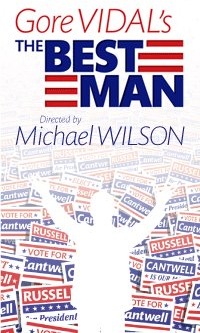
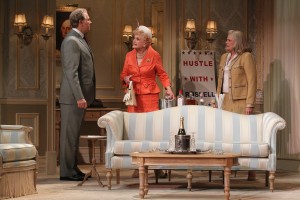
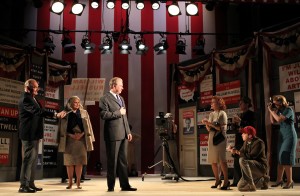
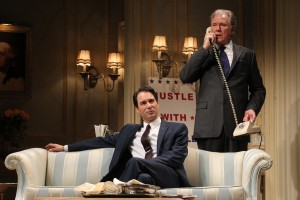
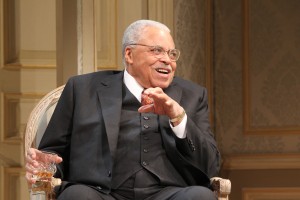
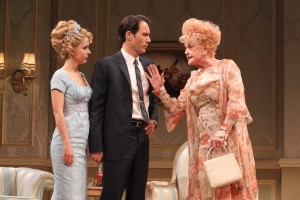
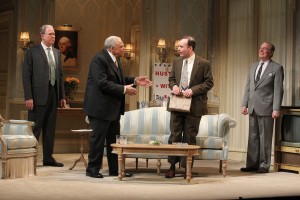
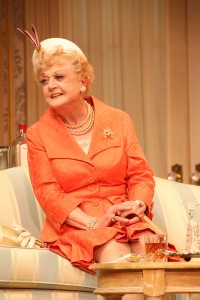

{ 1 comment… read it below or add one }
I’d see it anyway, if they gave comps to poor poets. Who else is writing about political realities that can get onto broadway?